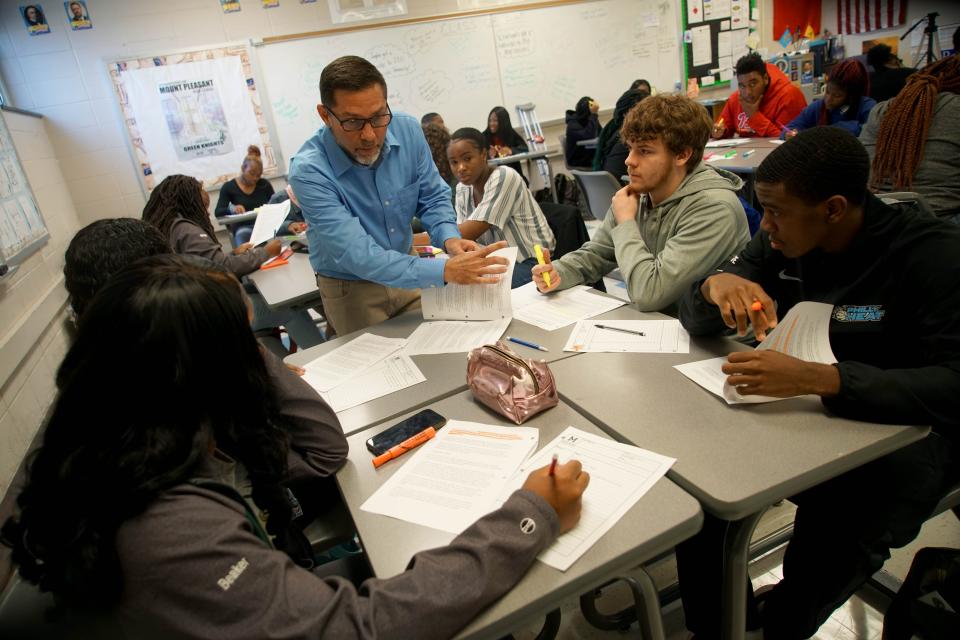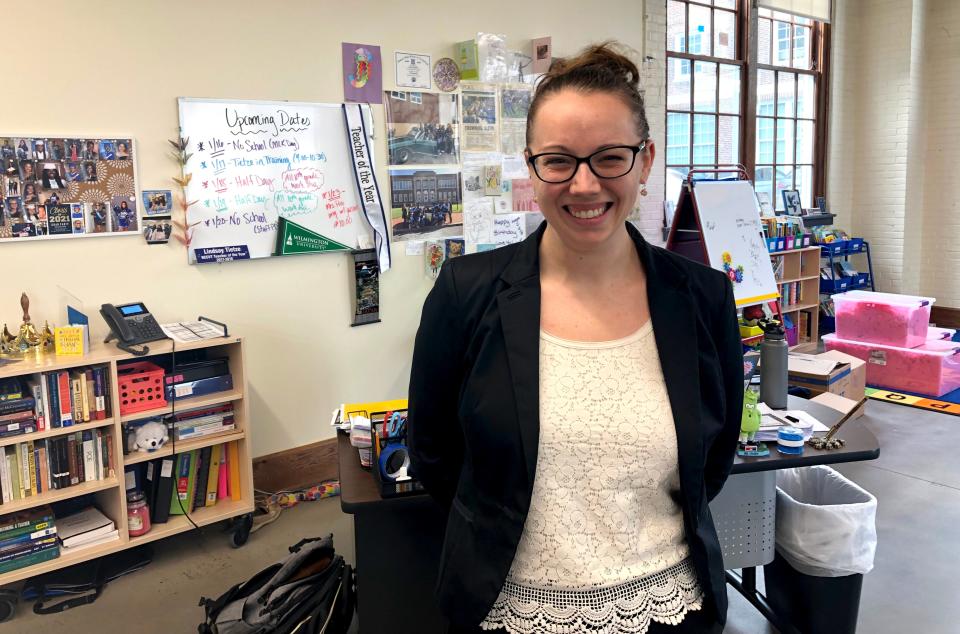Nationally teachers are calling it quits post-pandemic. What's the story in Delaware?
Lindsay Tietze can't imagine not working with kids everyday. She's gearing up for another year leading a high school Teacher Academy aimed at training the next generation of Delaware educators. She'll be in the classroom next fall.
Yet, Jordan McGinnes felt little support when trying to teach children with autism in Delaware public schools. It fueled further dissatisfaction with school administration above her. She resigned ahead of summer 2022.
Rachel Hoke liked being online. Her Delaware charter school had "Cyber Days" long before pandemic shutdown, but the music instructor realized being in the classroom wasn't her passion. Instead she finished a doctorate's degree and became an expert in instructional design. She had resigned in 2021.
Almost half of the public education employees in the country, from elementary and secondary, to higher education, left the sector in March by resignation.
Teachers calling it quits peaked early in the pandemic, as widely reported amid COVID-19 shutdowns, virtual learning and new protocols, before slowing down. But over the last two years, those numbers have crawled back up nationally, as shown in figures released by the U.S. Bureau of Labor Statistics in May.
A survey released in May by EdWeek Research Center and Merrimack College found the workforce is in “better shape” than the year before — but one in three teachers say they’re likely to quit and find something new in the next two years.
All of this follows a persistent trend in the same labor statistics over a decade: Quits are outpacing other exits from the field of education by a growing margin.
Delaware seems to be telling its own story.
Turnover rate in the First State — or teachers who did not return to public schools from the year before — remained relatively consistent over the pandemic’s peak, according to state data.
Overall exit rates vary if you catch teachers at one year, three years, or five years at Delaware schools, with averages there settling out at roughly 6%, 17% and 26%. But in each group, average turnover rates from 2015 to 2019 exceeded post-pandemic rates, on average by over one percentage point. And average turnover in general after 2020 continues a downward tick.
It doesn’t change the fact that the state is strapped with a teacher shortage. Or that teachers are being stretched thin throughout districts. It just means the pandemic alone isn’t to blame.
Deeper: How a national teacher shortage is affecting Delaware and what's being done to fix it
As Department of Education spokesperson Alison May told Delaware Online/The News Journal, the state has "fared relatively well, given the scale of the crisis." But by the start of this past school year, Delaware public schools had more than 500 open positions — about 5% of educator jobs statewide.
The state has lost 20% of its educational workforce overall since 2008, as previously reported.
So why are people leaving? It’s tough to pin-down an answer.
Diverse reasonings mark educator exits

Delaware doesn’t keep complete data on reasons for educator departures.
There’s an optional survey, according to the Department of Education, so response rate doesn't leave a complete data set. Without it, it’s difficult to decipher how the small state compares to teacher exit reasonings nationwide, from retirements, to external transfers, new jobs, deaths or just calling it quits.
Key drivers were somewhat consistent in available data. Concerns with district or school leadership led the list alongside career advancement, career change or a teacher's own return to school.
The state’s largest teachers union chimed in with its own findings.
"Teachers are finding many ways to leave the profession and use their background creatively," said Shelley Meadowcroft, spokesperson for the Delaware State Education Association. "They're not so pigeonholed by the degree that they had and background, as they were maybe 15 and 20 years ago."
More behind the numbers: Some Delaware students are suspended far more than others. How schools are addressing this
Education Roundup: All eyes on teacher pipeline as Delaware efforts support new educators
Rachel Hoke had always envisioned taking her doctorate in curriculum and instruction back to K-12 — so her move to a university came as "a culture shock." She says it's a good one.
"I ended up going to higher-ed instead, but largely out of opportunity," said the now Director for Teaching & Learning Design at the University of the Arts in Philadelphia. "Strikingly different, in a very positive way."
After nearly 14 years the educator had also realized working hectic days in front of the classroom just wasn't for her.
"When we had to come back, I realized that I was so much happier teaching online than I was teaching in the physical classroom, that I didn't want to go back," Hoke said. "But I understand that's probably not very representative of many of my colleagues experiences."
Other anecdotal drivers are quickly within reach.
Meadowcroft cited student behavioral challenges as a large stressor on teachers this year, possibly making sticking with the job less desirable, as staffing strains to keep up with some 7% increase in enrollment. Additionally, pressures from social and political issues, even "indoctrination" claims from far-right groups, have mounted on teachers throughout the country.
“We have to change the mindset around what it means to discipline a child."
Delaware schools have been struggling with student behavior. Black, lower income and students with disabilities are facing the brunt of their suspensions.@h_edelman dives in: https://t.co/OEmYq8F8qL— Kelly Powers (@kpowers01) June 7, 2023
Jordan McGinnes now works with Nemours Children's Health. The former teacher called the move from public schools to office coordinator "extremely terrifying," but she happily cites a higher salary and positive workplace. For her, a sense of little support from administration pushed her toward the door.
"Especially in special education" she said. "In certain environments, if you're not in a specialized school, there's not a ton of support for you as an educator."
Overall, Meadowcroft added, numbers of fresh majors in education have continued to dwindle.
"It's been multiple reasons, pre-COVID," Meadowcroft said. "But I think post-COVID, they're hearing from veteran teachers about the frustrations they're seeing."
Hopes to soften the blows
Lindsay Tietze isn't going anywhere.
"I think the issue really comes down to: There are so many things outside of your job that you are expected to take on," she said of post-pandemic strain. "And whether that's by your school, or by society, or by your students. It's not just like showing up and working."
With two master's degrees and years of experience, the K-12 Teacher Academy Instructor at Howard High School of Technology knows she could teach other places, or land a job outside the field. She could leave the building stressors of student behavior, mental wellness and growing expectations.
But even during a global health crisis, she couldn't imagine stepping away from kids.
"That's a lot of why you saw people push through it," she said. "It's not because they loved history or math — it's because they love kids."
Some signs have been giving her optimism for Delaware teacher retention. One, teachers are getting a raise.

Last month, the budget-writing Joint Finance Committee voted to fund a 9% pay increase for public school teachers first proposed by Gov. John Carney in January. Average starting salary for a teacher in Delaware is $45,448, according to the Delaware State Education Association.
Maryland posts $48,510, while set to increase to $60,000 by summer 2026. New Jersey's average starting teaching salary is $54,053, Pennsylvania's $46,991.
The governor has also pledged to increase opportunity funding to more than $50 million, which will go to lower-income students and English learners, alongside more funds for the coming Wilmington Learning Collaborative.
The General assembly has continued increasing funding and focus on school safety this year, as well as legislation surrounding substitute teachers and strengthening pipelines for paraprofessional educators.
Programs throughout the state hope to soften the blow of a continued educator shortage.
More money headed to teachers? Delaware governor wants to raise teacher salaries up to 9% in the next fiscal year
'Grow Your Own': How do you combat a teacher shortage? One Delaware district may have an answer
The “Grow Your Own” program gives grants to school districts to “improve the recruitment, retention, and diversity" of K-12 educators by connecting with students already on their enrollment sheets — then provide tuition support and other financial assistance in college for students who commit to teach at a given school for at least three years. Similarly, "Teacher Academies" allow students across the state to foster interest in an education career early.
"I've seen personally there has been a lot of love being shown to the Teacher Academy programs," said Tietze, leading her own within New Castle County Vocational-Technical School District, "with the hopes that this is going to really help offset an exodus that you're seeing from the profession."
Yearlong teacher residencies also provide college students with a stipend while they learn in the classroom, as previously reported, and student loan payment assistance is available for teachers in designated high-need schools or subject areas.
This and more adds up to "cautious optimism" for the Delaware State Education Association.
"I think that this 9% for teachers is positive, it's very positive. And it is a really good first step forward," Meadowcroft said. "So I am optimistic that our educators will see the work being done, and our legislature will support the work being done, and make sure that this is the beginning."
Kelly Powers covers race, culture and equity for the USA TODAY Network's Northeast Region and Delaware Online, with a focus on education. Contact her at kepowers@gannett.com or (231) 622-2191, and follow her on Twitter @kpowers01.
This article originally appeared on USA TODAY NETWORK: Nationally, teachers are leaving their jobs. What about in Delaware?

